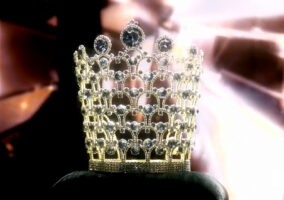
As we noted in our recap of “The Sound of Her Wings,” the closing of The Sandman‘s first arc and the introduction of his much cooler older sister represented a significant shift in the focus of the graphic novel series. After the introductions, table-setting, and nihilistic horror of the first arc, Death came in and reset everything to a dark fantasy setting. From this point, the original series started becoming the eventual masterpiece it became. Which is why it’s so insanely frustrating to watch the quality of the television series just plummet from this point to the end of the season. Yes, we’re sorry to say it’s happening. We interrupt this series of raves to give The Sandman its first critical pan of the season.
We’ve tried to dance around this and avoid being too blunt, but for us, it’s unavoidable this episode. She has no prior onscreen work and we won’t make judgments about her abilities overall, but Vanesu Samunyai is simply not good in the role of Rose Walker. She has exactly one facial expression and one line reading: a raised-eyebrow, open-mouthed look of confusion and a mildness of vocal delivery no matter what the scene asked for. “You’re the King of Dreams?” “You know where my brother is?” “You’re my long-lost great-grandmother and you’ve been in a coma for a century?” “My brother was in that house you’re pulling dead people out of and you don’t know what happened to him?” All delivered in the same near monotone with the same frozen expression, as if she were asking about specials on a menu. Her parents are dead, her brother is lost in the foster care system and a series of completely insane things keep happening to her and she never has a reaction more intense than mild confusion. The scene with The Fates made us crazy, because she acted the whole time like she was asking for directions to the rest room. Really hate to be harsh about this, but it was a mistake to center an entire arc around someone with no acting experience who isn’t up to the job. Especially when the first arc was stacked to the rafters with well known and highly trained actors, throwing the difference in skill into high relief. The first half of the season felt like prestige television and the second half almost immediately became a mid-week CW fantasy show.
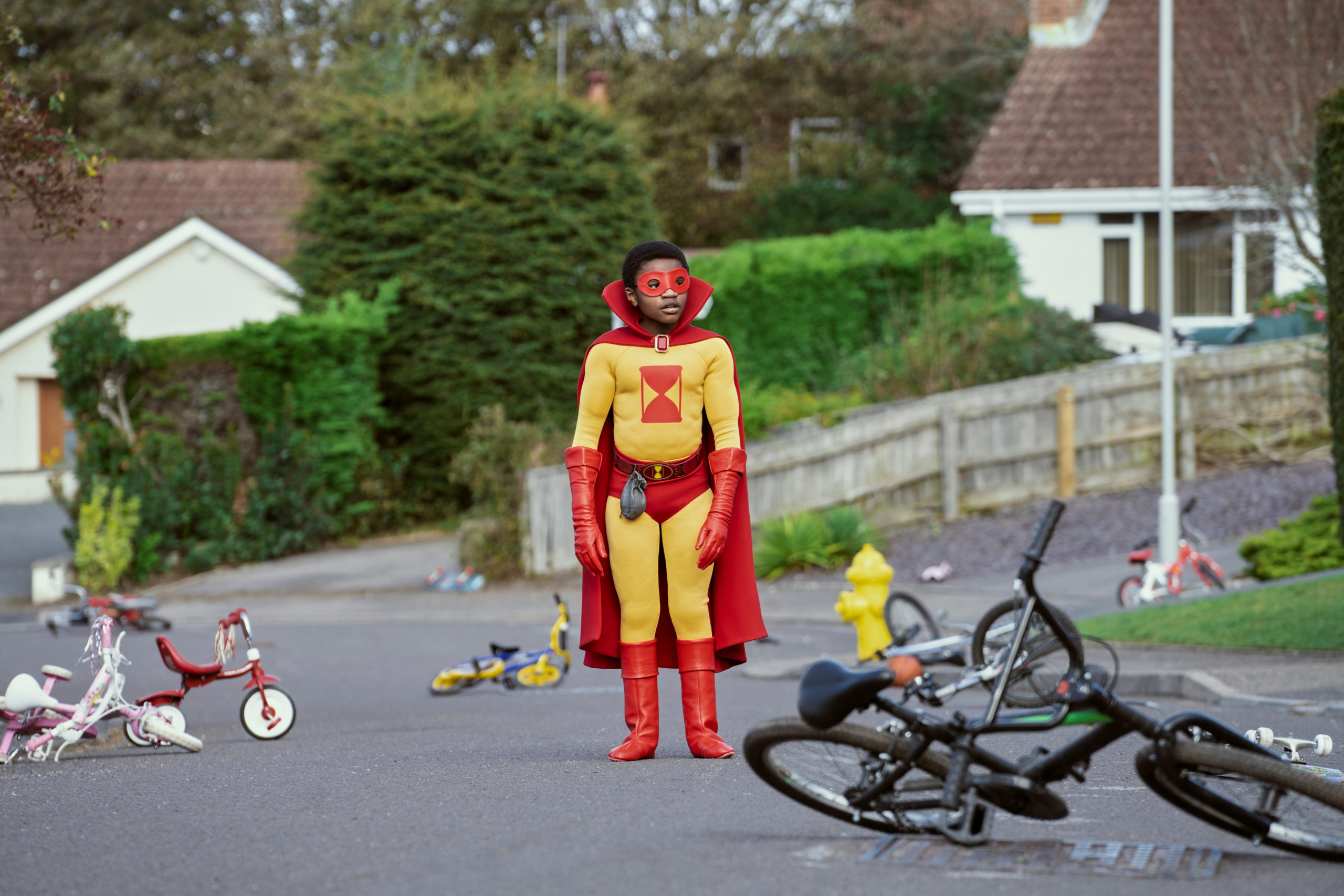
As we noted last episode, this arc, unlike the first one, deviates significantly from the original version in ways we won’t get into here. It’s possible that this put some sort of strain on the writing, because it’s not just the acting that underwhelms this episode. The plotting is… well, plodding. Last episode simply bounced back and forth from setting to setting as characters sat around and talked about what was happening. The opening five minutes of this episode was simply Dream telling Rose things the audience already knew. It seems to us that it was a mistake not to include the Unity Kinkaid subplot in the first arc of the season. She’s there in the first episode and then she’s ignored for seven episodes until she becomes a centerpiece of the next arc. This works just fine in serialized comics or discrete graphic novels, but it feels very choppy and confusing in a season of television. Had we occasionally checked in on the old woman who woke up after a century while Dream was off regaining his tools, this arc would have felt a bit more integrated and organic, we think.
But it’s not like it’s all bad from here on out. A good deal of this episode actually worked fine. Gault, the nightmare who cut Jed Walker (Eddie Kranja) off from the Dreaming, is a semi-necessary replacement for the characters in the original story who did the same thing, with motivations that had to be created entirely for this arc. We think they did a wonderful job and Ann Ogbomo is pretty great in the role. We even like the oddness of her whole look, which renders her as a fully fantastical being while keeping her recognizably a Black woman. Gault, Death, Lucienne and to a lesser extent Rose represent the very best examples of diversifying a fantasy cast and not making them all about their race or gender. The creators should be commended on how well they’ve done this, although ironically enough, we think it revealed some blind spots in the storytelling. Gault is living inside Jed Walker’s head and feeding him dreams of being a superhero called The Sandman. We should pause and note here that Jed’s whole look and setup as The Sandman is lifted directly from some old DC comics from the early ’70s and that this version of the character was created by the legendary Jack Kirby and Joe Simon, who are more well known for creating Captain America together. She’s feeding Jed exactly the kind of harmless adventure fantasies (“The Pied Piper is using next-gen sonic technology to control all the area’s children!”) most little kids would love to have when they go to sleep. As we’ll see, Jed’s home life is miserable and abusive. Whatever else Gault may be, nightmare or not, she’s a being who took the form of Jed’s dead mother so that he could retreat into safe and enjoyable power fantasies while he had the one chance to escape his torture every day: sleep. Unfortunately, she can’t shield him from the real world, so when a rat starts sampling him for breakfast while he sleeps, his dream fantasy turns dark quickly and he gets overwhelmed by an army of rats. His foster parents keep him locked in a basement, in squalid conditions and his foster father terrorizes his foster mother from showing him any kindness. We don’t necessarily need to be told why they’re treating Jed so badly, since child abuse doesn’t always have articulated motivations behind it, but we’ll just note that in the original telling, all of the various dark twists and turns of Jed’s life are more easily explained by his proximity to powerful dream beings who were affecting the people around him. We’re not sure that really comes across here or even if it was intended to.
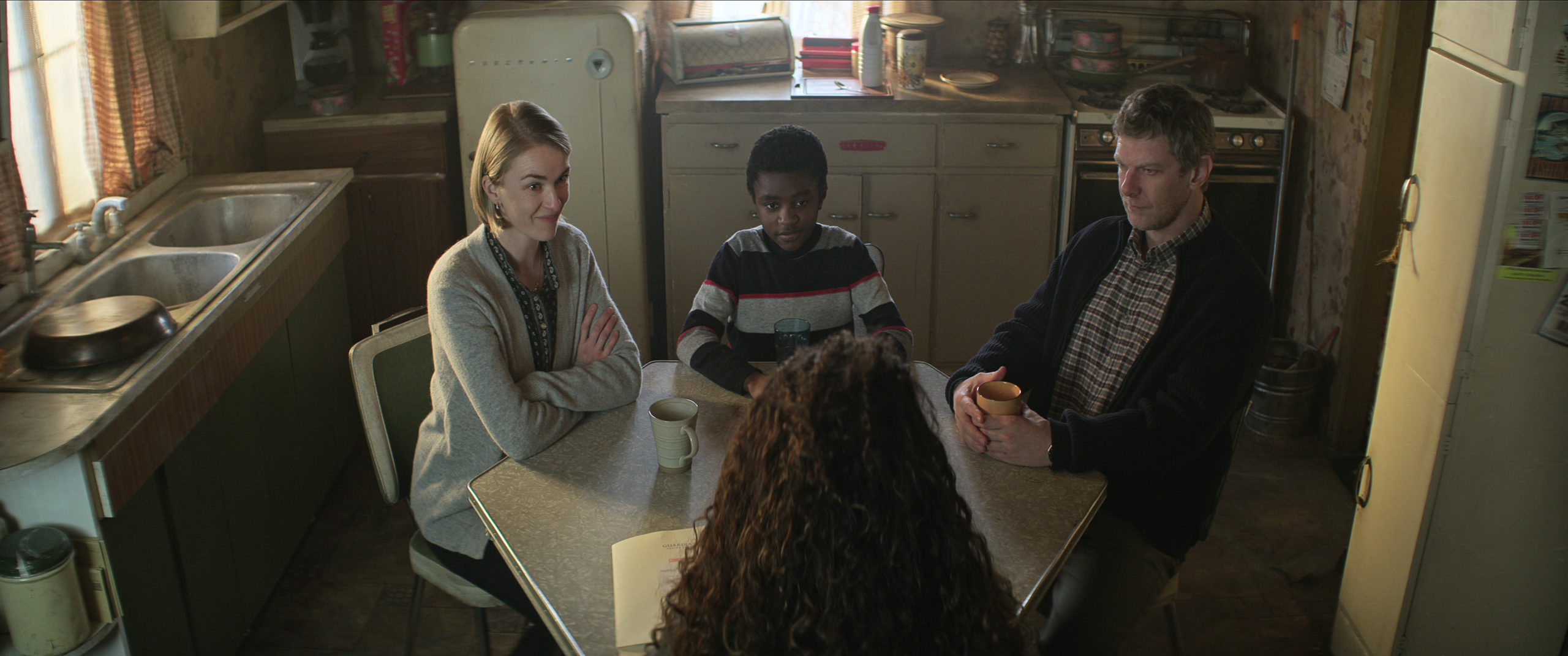
In other news, Lyta’s dreams of her dead husband take a decidedly weirder turn as he reveals that he can’t just be a dream, because he has an entire existence separate from her and he’s been building an entire life for the two of them every time she leaves him to go back to the waking world. He built their dream house, where he wants her to stay with him making dream babies and living their lives in neutral knits and athleisurewear forever. Lyta’s dreams look like a luxury home goods catalog, but hey, sometimes a girl’s gotta be a little bougie if she wants to stay with her hot ghost husband. She wakes up and joins the rest of the boarding house in helping Rose put up signs looking for her brother. Or at least, that’s what she tells Rose. Instead, she goes back to the foster agency to apologize for Rose’s outburst and make one last plea that someone check on Jed. It works, because the foster agent is soon sitting in his foster parents’ kitchen, pretending not to see how tense and unhealthy the entire environment is. This is a scenario where we think the show has a responsibility not to ignore the differences in undertone or meaning when you cast Black actors in stories like this. None of these nuances were in the original story when Rose and Jed were depicted as white, but here, Jed is a Black kid in the foster system being abused and threatened by white foster parents. A white social worker only agreed to check in on a Black child when a white woman begged her to and apologized for the Black family member’s anger. Then the white social worker asks for no alone time with the child, conducts no interview, and ignores the serious red flags the white foster parents are setting off. He had to literally risk his life just to get her to pay attention to him. Nothing about this is being unpacked or examined and it feels a little weirdly removed from the real world it’s trying to depict. It’s not so much that we needed someone to turn to the camera and give a speech about racial justice as we’d have liked at least one person to acknowledge that there might be a little racism fueling all of the roadblocks preventing Rose from finding her brother. It feels like a blind spot in the writing. Speaking of blind spot, Corinthian kills the social worker and eats her eyes.
In Lucienne’s library, a very animated Dream talks to his Royal Librarian about the unlikely possibility of the dream vortex forming because of his absence. For this second arc, with the dream lord now more powerful than he’s been in eons, they’ve caffeinated the character a little, for lack of a better word. He’s getting a little close to some sort of goth-lite version of Doctor Who and we can only guess that they figured the mopey, taciturn figure of the books was never going to work for an ongoing television series. This is more observation than complaint. It’s not how we’d have liked to see Morpheus interpreted, but we understand the reasoning behind it.
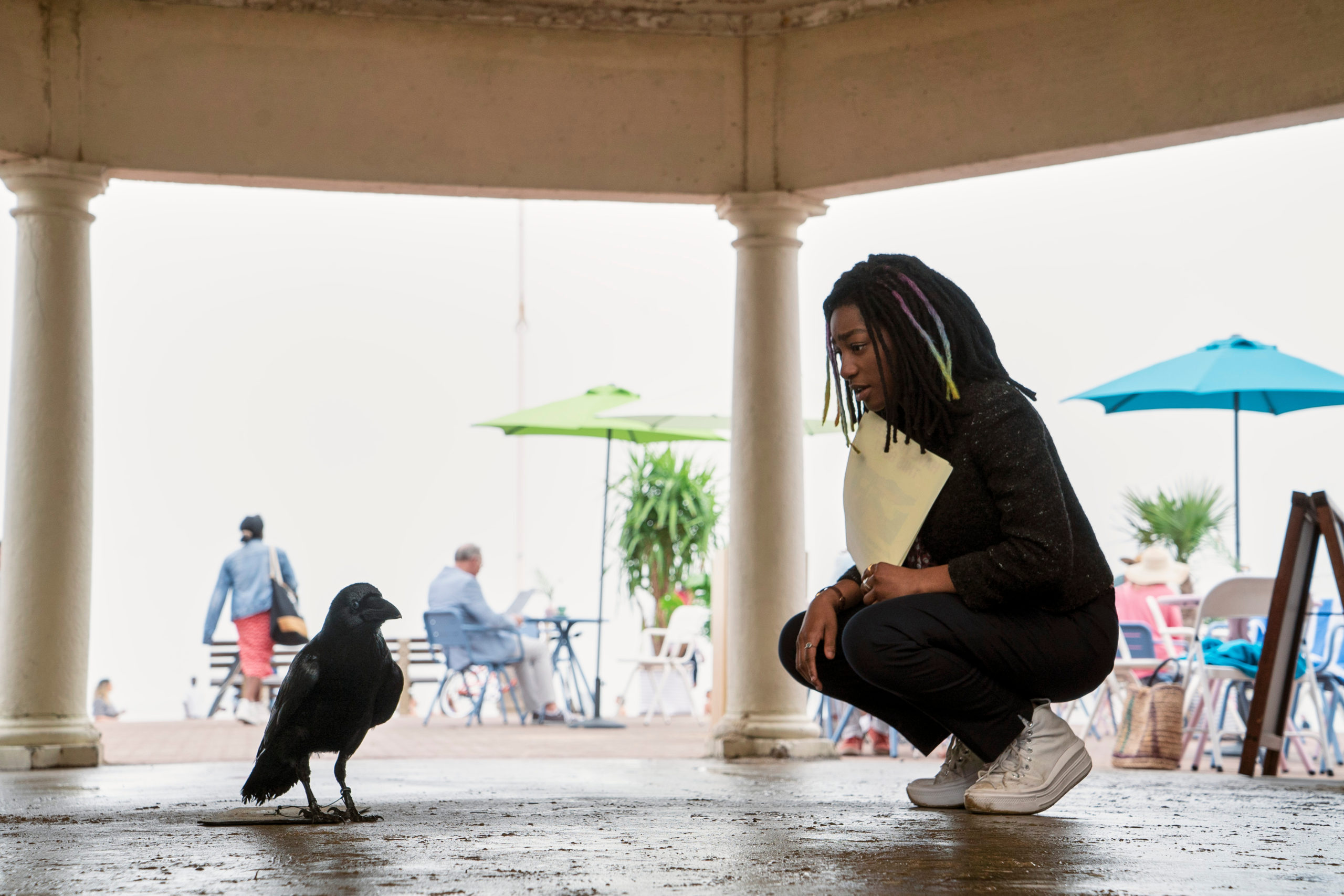
Rose is out walking around Cape Kennedy with Hal, putting up flyers and trading life stories with him. Hal talks about his dreams of being a Broadway star and how much he gave up when he let those dreams go. While some of the real world scenarios drag a bit in this arc, we never mind spending time with any of the fellow members of the boarding house. Rose thinks she notices Matthew trailing her (she met in Dream’s throne room, remember), and goes off to talk to him, eventually landing on the correct bird. She’s lucky she chose this moment to do so, because as Dream predicted last episode, the stray dreams are being drawn to her and here comes Corinthian, fresh from having tea with Unity. He knows one of Dream’s ravens when he sees one and he overhears Matthew saying that he can feel his master’s eyes in the back of his head. He high-tails it out of there and hits on Hal to get a flyer instead.
That night, Rose’s vortex powers get stronger as she winds up invading the dreams of her housemates. She watches Hal peel several faces off until he’s bleeding and raw bone. She watches Lyta having sex with her ghost husband in her neutral-toned modern castle. She watches Chantal give a bizarre speech about a sentence. She sees Ken naked in the street and begging Barbie to let her into his locked car. Morpheus finds her there and explains (again) what’s happening to her. She’s drawing everyone’s dream energy toward her. He encourages her to seek her own path (one nice production design touch here: the street signs and flyer all have jumbled, illegible dream characters instead of letters). They pass through Barbie’s unexpectedly rich fantasy adventure dream, where she’s a sunglasses-and-ballgown wearing princess on a quest with a giant toy-like creature named Martin Tenbones, and Zelda’s fantasy, where she’s a creepy little goth toddler in a graveyard. Morpheus tells her that most people seek some sort of home for themselves in dreams (like Hector and Lyta, for instance), which reminds her to look for Jed in their old neighborhood in dreams. Soon they find themselves face-to-face with Jed’s Sandman superhero fantasy. Gault won’t allow Jed to play out the fantasy in front of the dream lord, so she drops her control over him and he recognizes Rose as his sister. Dream, having reclaimed his errant nightmare, doesn’t help Rose one bit and wakes Jed up before he can tell her where he is. While we might not love the slightly jokey, smiling version of Dream the show sometimes portrays, we’re glad they haven’t shied away from reminding us every now and then what a dick he can be.
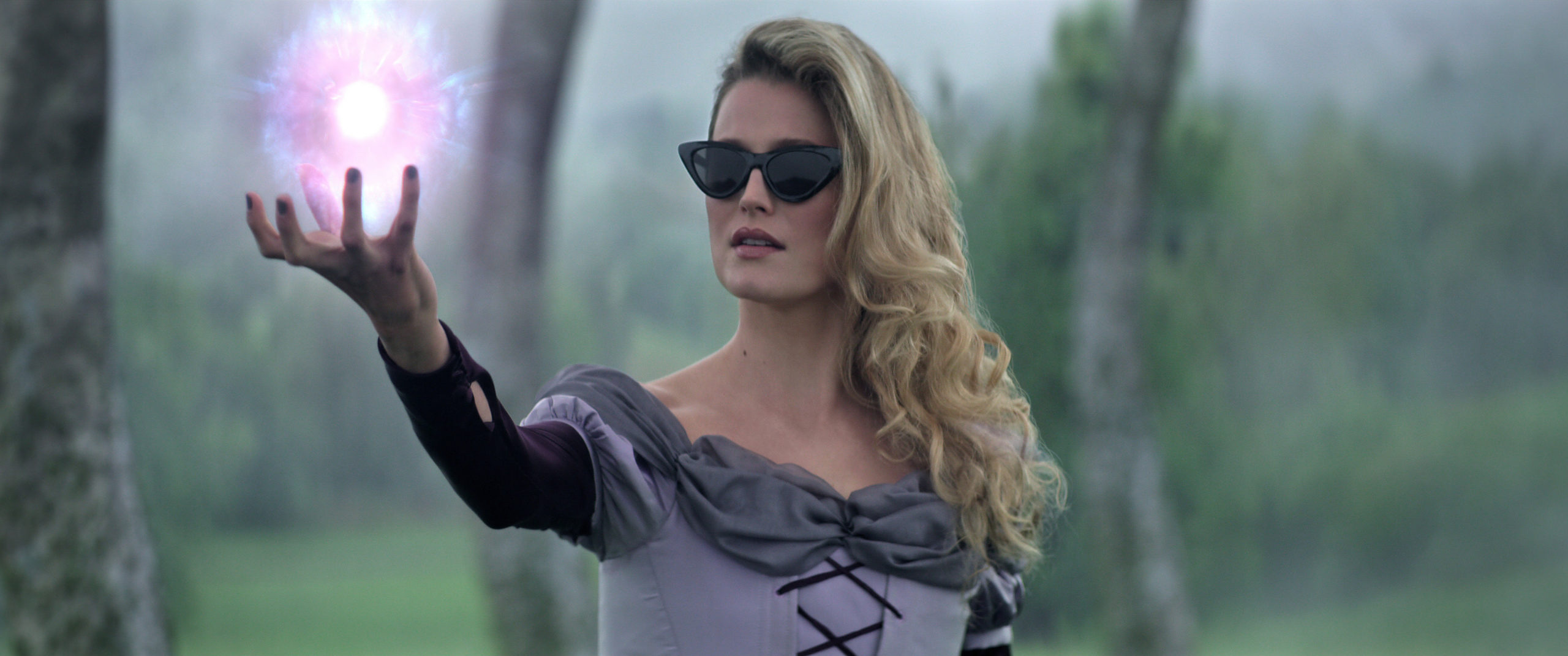
In his throne room, knowing what an unforgiving master he can be and how unlikely she is to survive this audience unscathed, Gault tears into Morpheus while a sympathetic Lucienne stands by. Again, not to over-analyze scenes or try to insert meanings that aren’t there, it still stands out to us to watch a Black woman advocate on behalf of a suffering Black child to an uninterested white man as another Black woman looks on. In this case, it would have been weird to insert some sort of racial observation given who the characters are, but it did lend the scene a power it might not otherwise have had. And it shows Dream in a truly terrible light as he “unmakes” Gault for defying him and then turns on Lucienne for expressing some sympathy for her, effectively demoting her. This conversation, about duty, responsibility, and Dream’s dislike of change, is central to his character and his story. This is one part of Dream’s personality that they’re getting exactly right.
Meanwhile, Lyta’s instantly pregnant in her dream castle and wakes up to find out she’s pregnant for real. Oh, and Corinthian killed Jed’s foster parents and told Jed he was taking him to see Rose. It’s all getting weirder!
Next: Collectors
A LEAGUE OF THEIR OWN Los Angeles Premiere Next Post:
WHERE THE CRAWDADS SING Star Daisy Edgar-Jones at the Locarno International Film Festival
Please review our Community Guidelines before posting a comment. Thank you!

